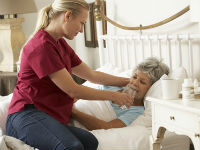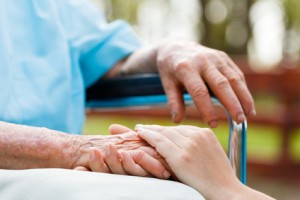 Dehydration is a serious condition and is the most common fluid and electrolyte problem affecting older patients, and homeostasis of fluid balance is essential for seniors during the heat of the summer months. Many older people, however, experience disturbances in fluid balances as the result of disease-related changes in water homeostasis.
Dehydration is a serious condition and is the most common fluid and electrolyte problem affecting older patients, and homeostasis of fluid balance is essential for seniors during the heat of the summer months. Many older people, however, experience disturbances in fluid balances as the result of disease-related changes in water homeostasis.
Water content decreases as the body ages. In fact, research shows that a 75- to 80-year old has almost half the body water content as a younger person. This decline in water content is even more substantial in older women.
Summer heat alone can increase an older person’s risk for dehydration, and the seasonal weather can work with other factors to result in fluid imbalances in the elderly patient. Clinicians should be aware of these other factors when assessing an elderly patient for dehydration.
Older Body, Higher Risk
The older body is at greater risk for dehydration for a variety of reasons. Aging causes changes in body water composition. Renal function tends to decline with age. Thirst perception also changes, leaving the older adult unaware of his or her body’s need for hydration, especially when the temperature starts to rise outside.
Some older people restrict their own fluid intake as a way to control incontinence or reduce the number of trips to the bathroom. Additionally, some suffer mobility problems that prevent them from securing or drinking an adequate volume of fluid. Other patients may be on diuretics or under fluid restrictions.
Certain illnesses, even mundane and often-unreported colds and flu, can increase the risk for fluid and electrolyte imbalances. Diarrhea, excessive sweating, loss of blood and diseases such as diabetes can contribute to the risk for dehydration in the summer.
Dementia and confusion may contribute to dehydration, especially with warm weather, as an older person may forget to drink fluids or be unaware of his body’s need for water. Caregivers must take special care to ensure adequate fluid intake in those with Alzheimer’s disease or other forms of dementia.
Diagnosis and Treatment of Dehydration in the Older Patient
Diagnosis of dehydration can be difficult because the classic signs and symptoms of it may not be present in the elderly patient. Detailed patient history and interviews can help the clinician identify these factors in older patients.
Signs and symptoms of dehydration in older adults may include confusion, low blood pressure and dryness of the tongue and mucus membranes. Other classic signs and symptoms of dehydration, such as oliguria, diminished skin turgor, increased thirst, low blood pressure and orthostatic hypotension may not develop or may be difficult to distinguish in elderly patients.
Diagnosing dehydration and monitoring fluid balance in the senior patient requires repeated measurements of his or her weight and creatinine as well as an assessment of physical signs such as tongue hydration. Laboratory testing can help too, with relevant tests including serum creatinine and urea concentrations. A urea/creatinine ratio greater than 0.1 is indicative of dehydration.
Prevention and rehydration measures require the patient to receive at least 1.5 liters of fluid daily, with the goal of restoring intake and output to a healthy balance. Elderly patients will likely require more fluids in the heat and humidity of summer. The route of fluid administration depends largely on the severity and acuteness of the patient’s clinical signs, as well as the ability of the patient to take in fluids quickly enough to compensate for warm temperatures in the heat of summer.
Need more information when it comes to senior health and safety tips this summer? Give Senior Living Options call today at 203.359.5777. We’re more than happy to help!
This entry was posted in Assisted Living and tagged dehydration, dehydration in seniors, Senior Care. Bookmark the permalink.
Author: Ann Jamison
Ann Jamison is an experienced senior advisor who has successfully worked with hundreds of families to help them find the best care and home-like environment for themselves or their loved ones. Prior to launching Senior Living Options, Ann was an eldercare advisor for a national placement agency and served as sales director at a senior living community. Thanks to her 25-year career in advertising sales and marketing, Ann is able to discern between hype and reality for her clients. Ann recognizes that there are objective factors that need to be weighed when making a life-changing decision, but she can also assess the important softer attributes by getting to know her clients and by using the gut instincts that can only come through extended experience.






Leave a Reply
Your email is safe with us.
You must be logged in to post a comment.